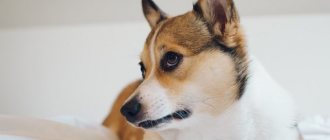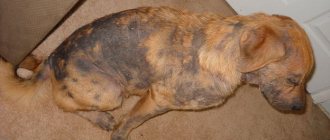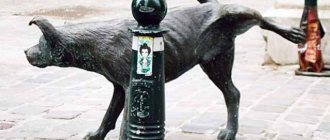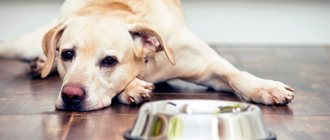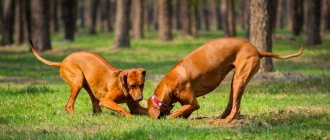Answer
To understand why a dog begins to urinate during sleep, let’s understand the normal indicators. Urine formation occurs in the glomeruli of the kidneys. Next, the liquid enters the pyelocaliceal system. Collecting and accumulating in the pelvis, urine gradually flows into the cavity of the bladder. The cycle is repeated several times per minute. The products of the body's activity accumulate in the cavity of the bladder and are held inside with the help of a powerful sphincter. Due to muscle contraction, fluid is not released out.
A nerve signal comes from the dog's brain, leading to relaxation of the sphincter muscles. Urine flows out through the lumen of the urethra. As soon as the bladder is empty, the sphincter closes. The urinary system is divided into two sections: the upper level is formed by the glomeruli and tubules and ureters. The lower level forms the bladder and urethra.
Causes
A variety of factors contribute to such unwanted behavior in a pet. But it should be remembered that the dog will never relieve himself in the wrong place out of harm.
A dog and a person perceive waste products differently. For an animal, excrement is not something disgusting. Animals can eat each other's feces, smear themselves with it, and lick other people's marks. It would never even occur to them to leave such a “surprise” out of a desire to harm a person.
It is difficult for a puppy to realize that he is being punished for a natural physiological process. A dog's guilty look is not a sign of awareness of the wrongness of an action, but a reaction to the owner's dissatisfaction.
Physiology
An understanding of the development of four-legged animals will help to understand why a puppy periodically shits on the sofa.
If the dog is healthy, then by 7 months he will learn to relieve himself on the street on his own. The wild ancestors of domestic animals did not allow puppies to urinate outside the den, so that predators would not find out about the presence of weak ones in the pack. For pets, an apartment is the same as a den, and they behave accordingly.
There are several physiological reasons:
- Sometimes a toilet slip is caused by the puppy’s instinctive desire to get rid of someone else’s smell (cat, other animal). The same can be said about the pet’s need to make new objects in the house (furniture, toys, etc.) “theirs.”
- Mature dogs mark territory, claiming rights to it, showing a dominant position. The pet pisses on the sofa, leaves surprises on the bed if it feels that its status in the pack (family) is decreasing. This happens when a new animal appears or a child begins to raise an adult.
- The dog attracts the attention of the opposite sex. This behavior is typical not only for males, but also for females during heat. Animals recognize each other's age, gender, and physiological state by smell.
- Up to two weeks, the mother stimulates the puppy to urinate by licking. For some, a similar reflex is preserved and transferred to humans. Therefore, an attempt to stroke the dog causes involuntary urination, which serves as a signal of submission.
This is interesting: Reasons for hostility between dogs and cats
This is interesting: Reasons for hostility between dogs and cats
An incorrectly developed reflex also contributes to the appearance of “little surprises.” For example, if a dog loves walks, and the owner brings it into the house in a hurry, as soon as it does its work, it will endure until the last. Involuntary defecation will occur already in the apartment.
Expert opinion
Anna Abramenko
An avid dog lover. Experience in veterinary medicine since 2009.
Ask a Question
If the owner punishes the puppy for toilet mistakes too zealously, he will begin to shit in the corners - away from sight.
The dog is afraid of urinating on the street if something frightened it during the process (a firecracker exploded, someone shouted, etc.).
Stress
Before you stop your dog from shitting on the bed, you need to find out whether this behavior is a consequence of a negative psychological state.
The following situations can be stressful:
- Some dogs, due to lack of attention, begin to doubt their own strengths and capabilities. Therefore, they perceive themselves as weak puppies. Low self-esteem forces them to relieve themselves in the wrong place.
- For poorly socialized dogs, going outside causes extreme anxiety and anxiety. They cannot cope with their fears and refuse to relieve themselves outside the home.
- Syndrome of expulsion from the pack. If the dog feels less love, it seems to him that they want to kick him out, separate him from the pack (family). By marking territory, he strives to consolidate his social position.
- There are animals that are afraid of loneliness. Communication is vital for them. As a sign of protest, the puppies begin to pee on their owner's bed.
In the absence of the above factors, you should pay attention to the well-being of your four-legged friend.
Health
If the owner of an adult dog is faced with a toilet problem, then the pet needs to be checked for the presence of diseases:
- cystitis;
- urolithiasis disease;
- urinary incontinence;
- dysbacteriosis;
- colitis;
- binge eating.
To prevent illness or treat your dog in a timely manner, you need to show it to the veterinarian more often and take urine and feces tests. This is especially true for representatives of elite breeds.
Sometimes it is more convenient for a dog to go to the owner’s soft bed to relieve itself, because it has sore joints, and it cannot take the correct position for defecation and go for a walk painlessly.
How to distinguish normality from pathology
Bedwetting has various causes. A “psychological problem” or the result of an existing inflammatory disease of the urinary system is likely.
To determine the exact etiology of bedwetting, your veterinarian will recommend a series of tests and tests. Research will reveal the true nature of your pet’s difficulty urinating and select adequate therapy.
First of all, the doctor will prescribe an ultrasound examination of the dog’s kidneys. This type of diagnosis will help identify the presence of inflammatory kidney diseases or pathology of organ formation. Perhaps it will determine the presence of a neoplasm in the pet.
Urine tests are required, which do not give such a clear picture, but allow one to assess the correct functioning of the kidneys. Using urine tests, it is possible to detect the presence of an infectious process in the urinary tract and kidneys, which cannot be determined by ultrasound.
In addition to the urological examination, it is necessary to evaluate the neurological status of the animal.
Bedwetting is often caused by diseases: cystitis, urolithiasis, diabetes mellitus, malignant neoplasms and benign tissue growths, inflammatory processes in the pelvic organs.
How to proceed:
First of all, you need to properly accustom the dog to the place. Remember one important rule from canine psychology: where a dog eats, it will never relieve itself, unless of course we are talking about a dog that has no health problems or a dog that is not in a state of severe fear.
Therefore, start feeding the dog in its place!
Never take your dog to its place, let it go on its own! You can take a piece in your hand and lead it to the place, then be sure to put the treat on the mat, or better yet more treats, be sure to give the command “place.”
Blot out the marks. Wash or even remove the bed on which the dog goes to the toilet for a while.
When to contact your veterinarian:
If you notice a puddle on the lounger as soon as the puppy wakes up, perhaps it happened in a dream, this is a reason to consult a doctor.
It’s also worth being wary and visiting a veterinarian’s office if the problem arose abruptly, that is, everything was fine for a long time and then there’s a puddle.
Etiology of bedwetting
There are several reasons for night urination in four-legged pets:
- True nocturnal incontinence in an animal consists of its spontaneous passage. Liquid is constantly leaking. The dog is not able to control the process for physiological reasons.
- Stress disorder - a dog may urinate in its sleep after experiencing severe fear or experiencing great joy. Such disorders gradually disappear on their own.
- Animal uncleanliness. This does not refer to pathology, but becomes the result of improper upbringing.
- Incontinence is due to the animal's advanced age and concomitant age-related bladder neuropathy.
Problems with urine output can be true or false. With true incontinence, the innervation of the bladder and urethra is impaired. Becomes a consequence of injury or neurological disease. Anatomical abnormalities in the development of the kidneys and urinary tract can lead to true incontinence.
False disturbance of urination acts as a symptom for other diseases. They include genitourinary infections or diabetes mellitus.
Why does a dog make puddles?
The first step is to find out why the dog is peeing. The reasons may vary. Let's look at the main ones. So why does this happen:
- Disease. The dog is toilet trained, but recently it has often started making puddles at home, including in its sleep. There are no stimulating factors. It is necessary to take the animal to the veterinarian so that he can conduct the necessary tests. The dog may have kidney or bladder disease, cystitis, or hormonal imbalance. Typically, such diseases “pursue” adult animals - after the age of 8 years. Sometimes the cause of a dog peeing in its sleep is a weakened sphincter. In such cases, a course of B vitamins is prescribed.
- Age. The puppy is simply not toilet trained yet. Or he is still too young to hold back. In this case, puddles appear at home at night or during the day - if the owner does not walk the pet enough.
- A dog or puppy pees with joy at the sight of its owner. This could also happen.
- Loud noises, fireworks and even severe punishments lead to the dog making a puddle. The reasons here are clear - the pet pees out of fear. This means that the animal is fearful and very emotional.
- The puppy cannot endure it for long. In this case, puddles often appear at night. Pay attention to the periods between walks. Perhaps you started taking your pet outside less often.
- Irregular feeding. It can also cause the animal's gastrointestinal tract to function irregularly. The owner’s task is to teach the pet to go to the toilet “on schedule.” Accordingly, it is also necessary to adhere to a certain feeding regimen. And the animal may drink too much, for example, due to the heat, so it is more difficult for him to restrain himself and endure.
- Demonstration of submission. The puppy pees at the sight of its owner, demonstrating its submission to him. This usually goes away before the animal reaches 8 months.
- Resentment. Yes, a dog can take revenge on its owner for something by making puddles at home.
- Estrus. During this period, the animal may walk more often than usual. A hormonal imbalance may occur, and the dog will make puddles even in its sleep.
- Bad manners. An animal may constantly make puddles at home due to the fact that it has not been trained to relieve itself outside.
Common reasons
A common pathology in dogs is inflammation of the bladder. More often, pathology is observed in females. To recognize the disorder, the veterinarian will recommend taking a urine sample for a general analysis. Bacteriological culture will be required to determine the flora and its sensitivity to antibacterial drugs. Based on the test results, the doctor will select the appropriate course of antibiotics for your pet.
Typically, the course of therapy lasts two weeks. Then a control examination of the animal is carried out. The symptom of night urination disappears within a couple of days after starting treatment with antibacterial drugs. The course of treatment will need to be completed. Termination is fraught with the development of serious complications.
Polydipsia is a pathological thirst in an animal, causing increased urine output. Constant unquenchable thirst is considered a symptom of a number of serious endocrinological diseases. To determine the diagnosis, the doctor will perform several functional tests.
How to stop your dog from shitting in inappropriate places
There are several recommendations that will help stop your dog from crapping in inappropriate places:
- if the dog begins to crap at home, he must be stopped immediately and taken outside;
- you need to walk the dog until it pees;
- if a pet shits in an inappropriate place, it must be scolded;
- so that the dog does not shit anywhere, he needs to be walked in special places that are intended for walking with dogs.
Important! In order for a puppy to begin to mature faster, it must be raised from an early age.
Ways to stop your dog from crapping at home
Puppies are easy to train and raise. To avoid misunderstandings with puddles on the floor, it is recommended to follow a strict walking and feeding schedule.
You should walk your dog at least twice a day for an hour at a set time for several weeks. It is equally important to sincerely praise her as soon as she pees in the right place. This will help develop the correct reflex in the animal.
Experienced dog breeders can easily recognize when their dog wants to go to the toilet:
- the dog breathes harder - a full urinary tract puts pressure on the diaphragm;
- looks more closely at the person and periodically touches him with his paw;
- standing instead of lying down;
- The hind legs are slightly apart, the animal is spinning and sniffing the floor.
If signs are detected, you should take an unscheduled walk and be sure to praise your pet for a job well done.




